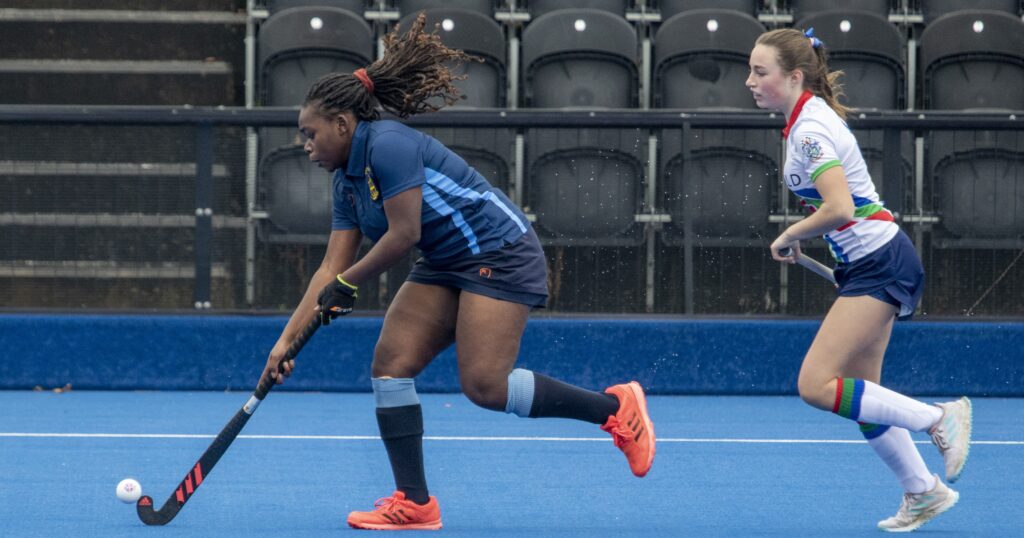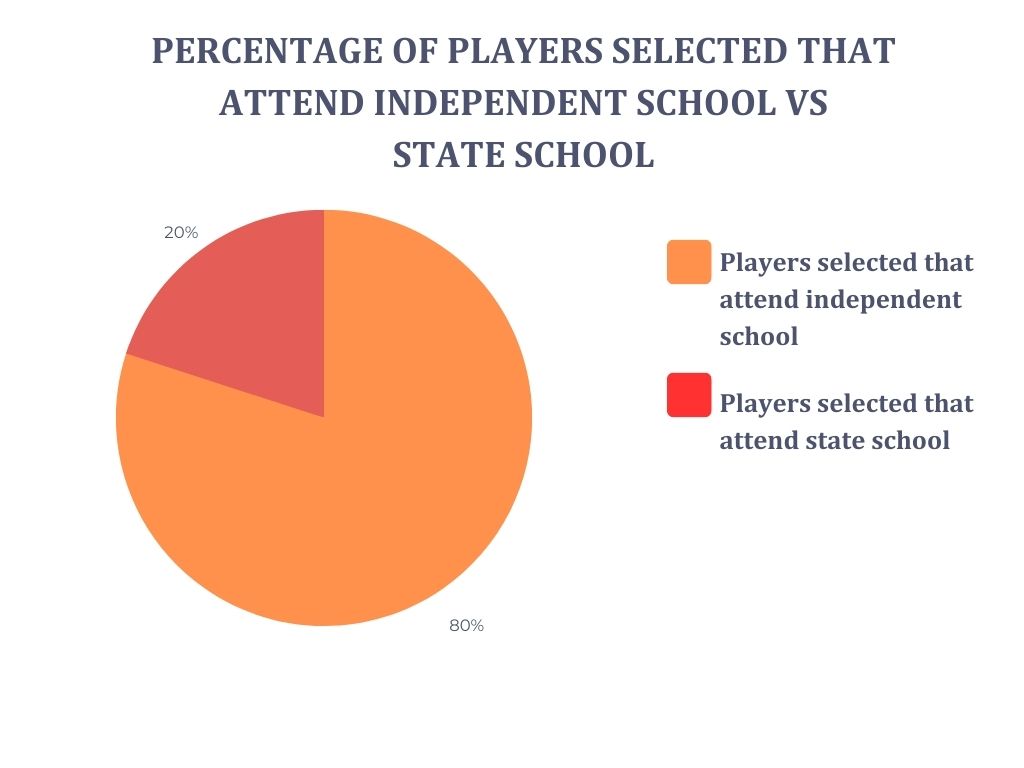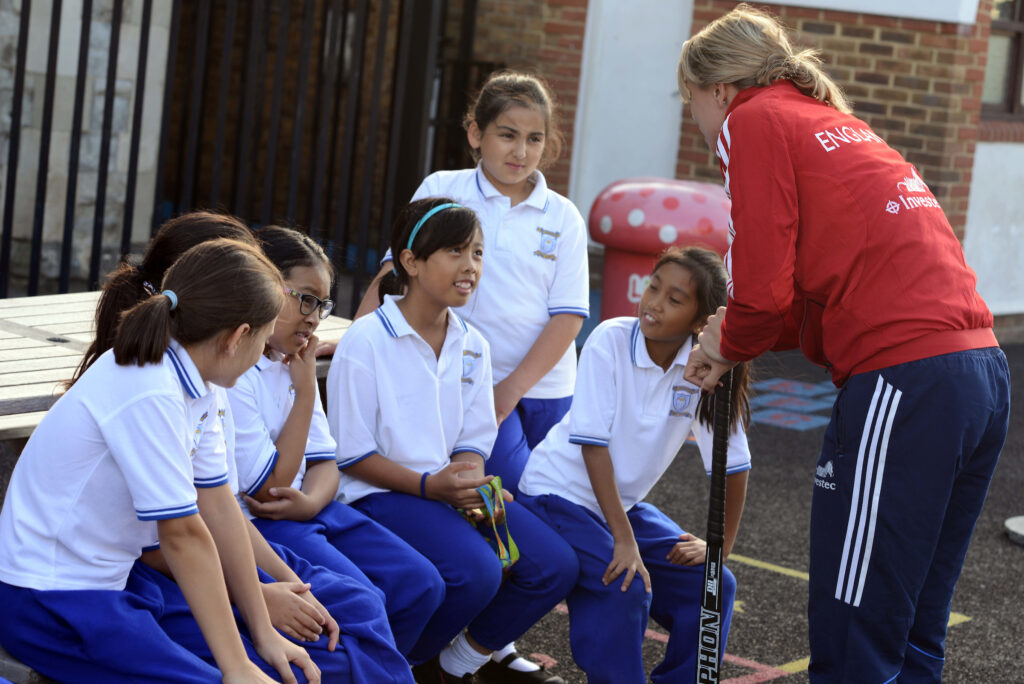Addressing imbalance in state and private school player selection is an England Hockey priority, reports ELIZABETH CONWAY
A few months ago, England Hockey announced the names of the talented players selected to be part of the England U16 Age Group programme. 80% of the under-16 boys and girls squads selected to be part of this programme attend independent schools.
Out of the 28 U16 boys selected to be part of the squad, 19 attend fee-paying, independent schools. Of the 27 under-16 girls selected, 25 attend a fee-paying private school. The average cost of attending one of these schools is £23,493 a year.
The under-16 players who were selected for the programme will get a season of training camps, with top coaches working with them, the chance to play in international matches, and are likely to continue to progress through the age-group programmes as more confident and skilful players.
Ultimately, they will have a better chance of reaching senior selection for international teams in the future, and no doubt many of these under-16s will go on to be some of the nation’s greatest players, representing England and Great Britain in Olympic, Commonwealth Games and World Cup hockey teams.
But if over 80% of the U16 squads attend independent schools, questions need to be asked about the future diversity of the Olympic, Commonwealth Games and World Cup hockey teams.
Why are state school hockey players at a disadvantage?
Lottie Porter plays for Buckingham Hockey Club and is a PE teacher at Great Marlow School, a non-selective state secondary school. She believes there are many barriers that face state-schools trying to teach hockey.
This starts with the lack of facilities in state schools, with many schools not having a suitable astroturf pitch, meaning pupils who are learning the game may have to play on concrete playgrounds or even in dining rooms. A limited budget to pay qualified coaches also means a lot of students aren’t receiving elite level coaching, unlike their counterparts in independent schools.

State schools also offer the chance to try many sports in a varied PE curriculum, rather than specialise in a few like hockey, rugby, lacrosse and cricket, which tends to be the staple diet for independent schools, who do not have to follow the National Curriculum. This can mean that they have less time to develop their skills in a particular sport.
“Teaching hockey requires specialist knowledge”
Independent schools traditionally have full extra-curricular programmes of sport which involve competitive fixtures against other similar schools. This happens less frequently in state schools, where often teachers do not have the time to dedicate to extra-curricular fixtures, because of the preparation for OFSTED inspections, which the independent sector does not have.
“You also have to consider the risks involved in hockey”, Porter said. “Like gymnastics in schools, it’s being delivered less and less because it’s technical, requiring specialist knowledge, and therefore if it’s delivered incorrectly, it can be dangerous. It’s incredibly difficult to teach hockey safely, if you are a non-specialist and naturally, a lot of specialist coaches work in private schools, because that is where they will be paid well”.
Pupils should also have at the very least, gum shields and shin pads for protection, and many pupils will be unable to provide those basic items of protective equipment.
Selectors need to look at a players’ ‘coaching age‘
Porter also says selectors choosing players to form representative age-group teams need to understand the context of the schools where the players are coming from.
“Selectors need to look at a players’ ‘coaching age’ and see their potential. Someone who has been playing hockey since they were five will have a much higher coaching age then someone who has just picked up a stick when they started secondary school. All of this needs to be considered in order to give state school students a chance.”

It is important to mention that it is not known how many of the players selected above receive scholarships to attend top independent schools in secondary school or sixth form.
This route into professional hockey was how England and GB forward Rhys Smith got into the age groups. He only picked up a stick for the first time at the age of 10 after winning a bursary to attend Whitgift, a private school in Croydon known for its sporting prowess.
He says joining Whitgift gave him “ambition and confidence” and believes England Hockey needs to help improve state school provision and try and best replicate the opportunities given in private schools.
What is England Hockey doing about this imbalance?
Nick Pink, England Hockey’s chief executive, spoke of the numerous changes to the school competition structure in recent years including the introduction of tiered competitions.
He explained that the aim of the new structure was to provide more opportunities for all schools, and therefore all players, to have more chances to play competitive hockey at the right level for them, including at the top level of the sport.
“This is an important step for state school players to compete at the very top and grow as hockey players,” Pink said.
England Hockey also offer the Diploma in Sporting Excellence programme which supports over 100 high-potential, state educated, players per year, in school years 12 and 13.

Their introduction of a new National State School Festival for 2023, taking place at Nottingham Hockey Centre on May 5 is “an important step in broadening access to players from all backgrounds” and an example of the “ongoing work within areas and counties to develop more opportunities for state school students across more age groups,” according to Pink.
What is England Hockey doing to address talent selection?
Pink acknowledged that addressing the imbalance in state and private school player selection was an “absolutely priority”.
He said that the England Hockey Equality Diversity & Inclusion framework sets out actions to address this imbalance across the whole of the sport.
“We know from data on our player pathway system, that independent schools offer scholarships to talented players who invest heavily in hockey, and while we cannot definitively comment on the exact number of cases this applies to, we are looking to add this avenue to our next data collection survey to establish the journey players have been on,” Pink explained.
Will future national teams look more diverse in the future?
“National teams will look more diverse in the future” according to Pink. However, he explained how it is not a “quick fix.”
Pink commented on the additional funding England Hockey have secured from Sport England for a Talent Inclusion project, to support the development of clubs and coaches from culturally diverse backgrounds and/or situated in culturally diverse locations, in order to reach a diverse demographic of hockey players.
“This is a long-term strategy which will take time to impact on national teams, but we believe the right processes are being put in place to ensure that our national teams are representative of the country they represent,” Pink said.
“But I think more importantly than that, we have a team of players in both the men and women’s squad that see the importance of strong state school participation. There is a culture of recognition across our squads that I’m really proud of, and that led to an open letter being sent to 10 Downing Street last year from the England Hockey men and women’s teams calling on government support to back the provision of PE and team sport within schools.”
Do you have a feature or story idea? Send your news. Get in touch!


Very interesting.
The key to successfully maximising the talent in state schools is partnership working. Forging strong links (both for players and coaches) between local schools and clubs helps massively in creating the momentum to achieve a reliable flow of young future stars.
At Fleet and Ewshot (a small club with 4 men’s, 4 women’s and usually no more than 1 team in each age group) we have for many years had club coaches (running their own businesses, but signposting juniors to us) in many of the local infant and junior schools. We then pick them up and develop them in the club and move them on to the County system, or the Talent Academy system.
We currently have former or current players from a state school background (who started in our minis) in the Wales Senior ladies squad, 2 in the Wales u18 boys squad (one of whom still plays for our Mens 1s) and the England u18 boys squad. The potential is out there – it just needs dedication, a plan and the will to seize opportunities when they arise.
My 13 year old son is a good sportsman and goes to a state school. He plays hockey since he’s 6. He has been selected to play for county this academic year and he seems to be the only state school kid there.
At trainings, he’s often starting on his own for warm up or drills, the coaches not really trying to mix the cliquey groups (most boys from different independent schools know each others and often wear their school kit). It’s often the same for ‘hockey development’. My son is not particularly shy but not outgoing either, more quietly confident. He tells me he’s “fine” and interacts a little bit with the other boys. But, as parent, it’s heartbreaking to see how singled-out he is. A friend noticed the exact same issue when her state school educated son tried out recently for South West England.
Sadly, I don’t think my son’ll be pursuing hockey next year (after 7 years in his team) because of the general lack of inclusion he has experienced with the sport (trainings are fine though), even though he is attached to his club and likes playing hockey.
He has developed great skills playing different sports as well as great friendships playing less than 7 years at rugby, cricket, basketball and football. But hockey unfortunately does seem as accessible or as friendly as other sports (even as parents).
I hope it’ll change as it’s a great sport that every kids should have access to and the possibility to fully enjoy.